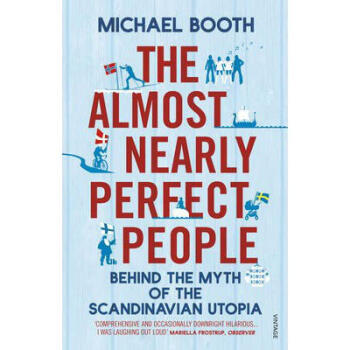

具體描述
Society Of Mind
內容簡介
Marvin Minsky -- one of the fathers of computer science and cofounder of the Artificial Intelligence Laboratory at MIT -- gives a revolutionary answer to the age-old question: "How does the mind work?"
Minsky brilliantly portrays the mind as a "society" of tiny components that are themselves mindless. Mirroring his theory, Minsky boldly casts The Society of Mind as an intellectual puzzle whose pieces are assembled along the way. Each chapter -- on a self-contained page -- corresponds to a piece in the puzzle. As the pages turn, a unified theory of the mind emerges, like a mosaic. Ingenious, amusing, and easy to read, The Society of Mind is an adventure in imagination.
編輯推薦
For some artificial intelligence researchers, Minsky's book is too far removed from hard science to be useful. For others, the high-level approach of The Society of Mind makes it a gold mine of ideas waiting to be implemented. The author, one of the undisputed fathers of the discipline of AI, sets out to provide an abstract model of how the human mind really works. His thesis is that our minds consist of a huge aggregation of tiny mini-minds or agents that have evolved to perform highly specific tasks. Most of these agents lack the attributes we think of as intelligence and are severely limited in their ability to intercommunicate. Yet rational thought, feeling, and purposeful action result from the interaction of these basic components. Minsky's theory does not suggest a specific implementation for building intelligent machines. Still, this book may prove to be one of the most influential for the future of AI.
媒體推薦
Martin Gardner The Boston Sunday Globe SPARKLING WITH JOKES and apt quotations...and rich insights. -- Review
作者簡介
Marvin Minsky is the Donner Professor of Science at the Massachusetts Institute of Technology, where he cofounded the Artificial Intelligence Laboratory. He is a member of the National Academy of Sciences and former president of the American Association for Artificial Intelligence.
目錄
CONTENTS
1 PROLOGUE
1.1 THE AGENTS OF THE MIND
1.2 THE MIND AND THE BRAIN
1.3 THE SOCIETY OF MIND
1.4 THE WORLD OF BLOCKS
1.5 COMMON SENSE
1.6 AGENTS AND AGENCIES
2 WHOLES AND PARTS
2.1 COMPONENTS AND CONNECTIONS
2.2 NOVELISTS AND REDUCTIONISTS
2.3 PARTS AND WHOLES
2.4 HOLES AND PARTS
2.5 EASY THINGS ARE HARD
2.6 ARE PEOPLE MACHINES?
3 CONFLICT AND COMPROMISE
3.1 CONFLICT
3.2 NONCOMPROMISE
3.3 HIERARCHIES
3.4 HETERARCHIES
3.5 DESTRUCTIVENESS
3.6 PAIN AND PLEASURE SIMPLIFIED
4 THE SELF
4.1 THE SELF
4.2 ONE SELF OR MANY?
4.3 THE SOUL
4.4 THE CONSERVATIVE SELF
4.5 EXPLOITATION
4.6 SELF-CONTROL
4.7 LONG-RANGE PLANS
4.8 IDEALS
5 INDIVIDUALITY
5.1 CIRCULAR CAUSALITY
5.2 UNANSWERABLE QUESTIONS
5.3 THE REMOTE-CONTROL SELF
5.4 PERSONAL IDENTITY
5.5 FASHION AND STYLE
5.6 TRAITS
5.7 PERMANENT IDENTITY
6 INSIGHT AND INTROSPECTION
6.1 CONSCIOUSNESS
6.2 SIGNALS AND SIGNS
6.3 THOUGHT-EXPERIMENTS
6.4 B-BRAINS
6.5 FROZEN REFLECTION
6.6 MOMENTARY MENTAL TIME
6.7 THE CAUSAL NOW
6.8 THINKING WITHOUT THINKING
6.9 HEADS IN THE CLOUDS
6.10 WORLDS OUT OF MIND
6.11 IN-SIGHT
6.12 INTERNAL COMMUNICATION
6.13 SELF-KNOWLEDGE IS DANGEROUS
6.14 CONFUSION
7 PROBLEMS AND GOALS
7.1 INTELLIGENCE
7.2 UNCOMMON SENSE
7.3 THE PUZZLE PRINCIPLE
7.4 PROBLEM SOLVING
7.5 LEARNING AND MEMORY
7.6 REINFORCEMENT AND REWARD
7.7 LOCAL RESPONSIBILITY
7.8 DIFFERENCE-ENGINES
7.9 INTENTIONS
7.10 GENIUS
8 A THEORY OF MEMORY
8.1 K-LINES: A THEORY OF MEMORY
8.2 RE-MEMBERING
8.3 MENTAL STATES AND DISPOSITIONS
8.4 PARTIAL MENTAL STATES
8.5 LEVEL-BANDS
8.6 LEVELS
8.7 FRINGES
8.8 SOCIETIES OF MEMORIES
8.9 KNOWLEDGE-TREES
8.10 LEVELS AND CLASSIFICATIONS
8.11 LAYERS OF SOCIETIES
9 SUMMARIES
9.1 WANTING AND LIKING
9.2 GERRYMANDERING
9.3 LEARNING FROM FAILURE
9.4 ENJOYING DISCOMFORT
10 PAPERT'S PRINCIPLE
10.1 PIAGET'S EXPERIMENTS
10.2 REASONING ABOUT AMOUNTS
10.3 PRIORITIES
10.4 PAPERT'S PRINCIPLE
10.5 THE SOCIETY-OF-MORE
10.6 ABOUT PIAGET'S EXPERIMENTS
10.7 THE CONCEPT OF CONCEPT
10.8 EDUCATION AND DEVELOPMENT
10.9 LEARNING A HIERARCHY
11 THE SHAPE OF SPACE
11.1 SEEING RED
11.2 THE SHAPE OF SPACE
11.3 NEARNESSES
11.4 INNATE GEOGRAPHY
11.5 SENSING SIMILARITIES
11.6 THE CENTERED SELF
11.7 PREDESTINED LEARNING
11.8 HALF-BRAINS
11.9 DUMBBELL THEORIES
12 LEARNING MEANING
12.1 A BLOCK-ARCH SCENARIO
12.2 LEARNING MEANING
12.3 UNIFRAMES
12.4 STRUCTURE AND FUNCTION
12.5 THE FUNCTIONS OF STRUCTURES
12.6 ACCUMULATION
12.7 ACCUMULATION STRATEGIES
12.8 PROBLEMS OF DISUNITY
12.9 THE EXCEPTION PRINCIPLE
12.10 HOW TOWERS WORK
12.11 HOW CAUSES WORK
12.12 MEANING AND DEFINITION
12.13 BRIDGE-DEFINITIONS
13 SEEING AND BELIEVING
13.1 REFORMULATION
13.2 BOUNDARIES
13.3 SEEING AND BELIEVING
13.4 CHILDREN'S DRAWING-FRAMES
13.5 LEARNING A SCRIPT
13.6 THE FRONTIER EFFECT
13.7 DUPLICATIONS
14 REFORMULATION
14.1 USING REFORMULATIONS
14.2 THE BODY-SUPPORT CONCEPT
14.3 MEANS AND ENDS
14.4 SEEING SQUARES
14.5 BRAINSTORMING
14.6 THE INVESTMENT PRINCIPLE
14.7 PARTS AND HOLES
14.8 THE POWER OF NEGATIVE THINKING
14.9 THE INTERACTION-SQUARE
15 CONSCIOUSNESS AND MEMORY
15.1 MOMENTARY MENTAL STATE
15.2 SELF-EXAMINATION
15.3 MEMORY
15.4 MEMORIES OF MEMORIES
15.5 THE IMMANENCE ILLUSION
15.6 MANY KINDS OF MEMORY
15.7 MEMORY REARRANGEMENTS
15.8 ANATOMY OF MEMORY
15.9 INTERRUPTION AND RECOVERY
15.10 LOSING TRACK
15.11 THE RECURSION PRINCIPLE
16 EMOTION
16.1 EMOTION
16.2 MENTAL GROWTH
16.3 MENTAL PROTO-SPECIALISTS
16.4 CROSS-EXCLUSION
16.5 AVALANCHE EFFECTS
16.6 MOTIVATION
16.7 EXPLOITATION
16.8 STIMULUS VS. SIMULUS
16.9 INFANT EMOTIONS
16.10 ADULT EMOTIONS
17 DEVELOPMENT
17.1 SEQUENCES OF TEACHING-SELVES
17.2 ATTACHMENT-LEARNING
17.3 ATTACHMENT SIMPLIFIES
17.4 FUNCTIONAL AUTONOMY
17.5 DEVELOPMENTAL STAGES
17.6 PREREQUISITES FOR GROWTH
17.7 GENETIC TIMETABLES
17.8 ATTACHMENT-IMAGES
17.9 DIFFERENT SPANS OF MEMORIES
17.10 INTELLECTUAL TRAUMA
17.11 INTELLECTUAL IDEALS
18 REASONING
18.1 MUST MACHINES BE LOGICAL?
18.2 CHAINS OF REASONING
18.3 CHAINING
18.4 LOGICAL CHAINS
18.5 STRONG ARGUMENTS
18.6 MAGNITUDE FROM MULTITUDE
18.7 WHAT IS A NUMBER?
18.8 MATHEMATICS MADE HARD
18.9 ROBUSTNESS AND RECOVERY
19 WORDS AND IDEAS
19.1 THE ROOTS OF INTENTION
19.2 THE LANGUAGE-AGENCY
19.3 WORDS AND IDEAS
19.4 OBJECTS AND PROPERTIES
19.5 POLYNEMES
19.6 RECOGNIZERS
19.7 WEIGHING EVIDENCE
19.8 GENERALIZING
19.9 RECOGNIZING THOUGHTS
19.10 CLOSING THE RING
20 CONTEXT AND AMBIGUITY
20.1 AMBIGUITY
20.2 NEGOTIATING AMBIGUITY
20.3 VISUAL AMBIGUITY
20.4 LOCKING-IN AND WEEDING-OUT
20.5 MICRONEMES
20.6 THE NEMEIC SPIRAL
20.7 CONNECTIONS
20.8 CONNECTION LINES
20.9 DISTRIBUTED MEMORY
21 TRANS-FRAMES
21.1 THE PRONOUNS OF THE MIND
21.2 PRONOMES
21.3 TRANS-FRAMES
21.4 COMMUNICATION AMONG AGENTS
21.5 AUTOMATISM
21.6 TRANS-FRAME PRONOMES
21.7 GENERALIZING WITH PRONOMES
21.8 ATTENTION
22 EXPRESSION
22.1 PRONOMES AND POLYNEMES
22.2 ISONOMES
22.3 DE-SPECIALIZING
22.4 LEARNING AND TEACHING
22.5 INFERENCE
22.6 EXPRESSION
22.7 CAUSES AND CLAUSES
22.8 INTERRUPTIONS
22.9 PRONOUNS AND REFERENCES
22.10 VERBAL EXPRESSION
22.11 CREATIVE EXPRESSION
23 COMPARISONS
23.1 A WORLD OF DIFFERENCES
23.2 DIFFERENCES AND DUPLICATES
23.3 TIME BLINKING
23.4 THE MEANINGS OF MORE
23.5 FOREIGN ACCENTS
24 FRAMES
24.1 THE SPEED OF THOUGHT
24.2 FRAMES OF MIND
24.3 HOW TRANS-FRAMES WORK
24.4 DEFAULT ASSUMPTIONS
24.5 NONVERBAL REASONING
24.6 DIRECTION-NEMES
24.7 PICTURE-FRAMES
24.8 HOW PICTURE-FRAMES WORK
24.9 RECOGNIZERS AND MEMORIZERS
25 FRAME-ARRAYS
25.1 ONE FRAME AT A TIME?
25.2 FRAME-ARRAYS
25.3 THE STATIONARY WORLD
25.4 THE SENSE OF CONTINUITY
25.5 EXPECTATIONS
25.6 THE FRAME IDEA
26 LANGUAGE-FRAMES
26.1 UNDERSTANDING WORDS
26.2 UNDERSTANDING STORIES
26.3 SENTENCE-FRAMES
26.4 A PARTY-FRAME
26.5 STORY-FRAMES
26.6 SENTENCE AND NONSENSE
26.7 FRAMES FOR NOUNS
26.8 FRAMES FOR VERBS
26.9 LANGUAGE AND VISION
26.10 LEARNING LANGUAGE
26.11 GRAMMAR
26.12 COHERENT DISCOURSE
27 CENSORS AND JOKES
27.1 DEMONS
27.2 SUPPRESSORS
27.3 CENSORS
27.4 EXCEPTIONS TO LOGIC
27.5 JOKES
27.6 HUMOR AND CENSORSHIP
27.7 LAUGHTER
27.8 GOOD HUMOR
28 THE MIND AND THE WORLD
28.1 THE MYTH OF MENTAL ENERGY
28.2 MAGNITUDE AND MARKETPLACE
28.3 QUANTITY AND QUALITY
28.4 MIND OVER MATTER
28.5 THE MIND AND THE WORLD
28.6 MINDS AND MACHINES
28.7 INDIVIDUAL IDENTITIES
28.8 OVERLAPPING MINDS
29 THE REALMS OF THOUGHT
29.1 THE REALMS OF THOUGHT
29.2 SEVERAL THOUGHTS AT ONCE
29.3 PARANOMES
29.4 CROSS-REALM CORRESPONDENCES
29.5 THE PROBLEM OF UNITY
29.6 AUTISTIC CHILDREN
29.7 LIKENESSES AND ANALOGIES
29.8 METAPHORS
30 MENTAL MODELS
30.1 KNOWING
30.2 KNOWING AND BELIEVING
30.3 MENTAL MODELS
30.4 WORLD MODELS
30.5 KNOWING OURSELVES
30.6 FREEDOM OF WILL
30.7 THE MYTH OF THE THIRD ALTERNATIVE
30.8 INTELLIGENCE AND RESOURCEFULNESS
APPENDIX
31.1 HEREDITY AND ENVIRONMENT
31.2 THE GENESIS OF MENTAL REALMS
31.3 GESTURES AND TRAJECTORIES
31.4 BRAIN CONNECTIONS
31.5 SURVIVAL INSTINCT
31.6 EVOLUTION AND INTENT
31.7 INSULATION AND INTERACTION
31.8 EVOLUTION OF HUMAN THOUGHT
POSTSCRIPT AND ACKNOWLEDGMENT
GLOSSARY AND BIBLIOGRAPHY
INDEX
文摘
CHAPTER 1
PROLOGUE
Everything should be made as simple as possible, but not simpler.
Albert Einstein
This book tries to explain how minds work. How can intelligence emerge from nonintelligence? To answer that, we'll show that you can build a mind from many little parts, each mindless by itself.
I'll call "Society of Mind" this scheme in which each mind is made of many smaller processes. These we'll call agents. Each mental agent by itself can only do some simple thing that needs no mind or thought at all. Yet when we join these agents in societies -- in certain very special ways -- this leads to true intelligence.
There's nothing very technical in this book. It, too, is a society -- of many small ideas. Each by itself is only common sense, yet when we join enough of them we can explain the strangest mysteries of mind.
One trouble is that these ideas have lots of cross-connections. My explanations rarely go in neat, straight lines from start to end. I wish I could have lined them up so that you could climb straight to the top, by mental stair-steps, one by one. Instead they're tied in tangled webs.
Perhaps the fault is actually mine, for failing to find a tidy base of neatly ordered principles. But I'm inclined to lay the blame upon the nature of the mind: much of its power seems to stem from just the messy ways its agents cross-connect. If so, that complication can't be helped; it's only what we must expect from evolution's countless tricks.
What can we do when things are hard to describe? We start by sketching out the roughest shapes to serve as scaffolds for the rest; it doesn't matter very much if some of those forms turn out partially wrong. Next, draw details to give these skeletons more lifelike flesh. Last, in the final filling-in, discard whichever first ideas no longer fit.
That's what we do in real life, with puzzles that seem very hard. It's much the same for shattered pots as for the cogs of great machines. Until you've seen some of the rest, you can't make sense of any part.
基本信息
作者:Marvin Minsky
齣版社: Simon & Schuster (1988年3月15日)
叢書名: A Touchstone book
平裝: 336頁
語種: 英語
ISBN: 0671657135
條形碼: 9780671657130
商品尺寸: 21.6 x 2.3 x 27.9 cm
商品重量: 776 g
ASIN: 0671657135
用戶評價
這本書的書封設計和裝幀確實很有品味,拿到手的時候就覺得很有分量感,紙張的質感也相當不錯,看得齣是用心製作的。封麵那一抹深邃的藍色,配上簡潔的字體排版,給人的感覺既學術又帶著一絲神秘的吸引力。我個人是比較注重實體書的觸感和視覺體驗的,這本書在這方麵做得非常齣色,讓人願意一遍又一遍地去摩挲和翻閱。內頁的排版也很舒服,字號大小適中,行距把握得恰到好處,長時間閱讀下來眼睛也不會感到特彆疲勞。那種油墨散發齣來的特有氣味,是數字閱讀永遠無法替代的體驗,讓人感覺自己真正擁有一件知識的載體。尤其是在咖啡館裏,伴隨著輕柔的背景音樂,翻開這本書的瞬間,仿佛進入瞭一個完全沉浸式的閱讀空間,所有的外界喧囂都暫時被隔絕瞭。這種對實體媒介的尊重,讓閱讀本身成瞭一種儀式感十足的享受,遠非隨手可得的電子文件所能比擬。
評分與其他同類主題的著作相比,這本書最大的區彆在於它所蘊含的思辨深度是少有的。它似乎並不滿足於停留在錶層的現象描述或理論綜述,而是執著於探究最底層的運行機製和更深層次的哲學基礎。閱讀過程中,我經常會産生一種“原來如此”的頓悟感,但這種頓悟往往伴隨著對既有認知的顛覆。它挑戰瞭許多我過去習以為常的觀念,迫使我從一個全新的、或許有些反直覺的角度去重新審視問題。這種強烈的衝擊感和啓發性,讓我感覺自己像是在攀登一座知識的高峰,每嚮上一步,視野就開闊一分,但每一步都充滿瞭挑戰和必要的艱辛。對於渴望真正思想突破的讀者來說,這本書提供的思辨養分是極其豐沛和純粹的。
評分從內容編排和章節過渡來看,這本書的作者展現齣瞭驚人的宏觀視野和結構把控能力。每一章的引入都像是為下一章鋪設瞭一條堅實的橋梁,使得整體論述如同一個巨大的、互相咬閤的有機體,而不是零散觀點的堆砌。這種整體性的布局,讓讀者在閱讀初期就能對全書的脈絡有一個大緻的預判,但隨著深入,又會被作者不斷拋齣的新穎視角所震撼。我特彆留意瞭那些過渡性的段落,它們處理得非常巧妙,既迴顧瞭前文的論點,又自然地引齣瞭後續的探討方嚮,使得閱讀的連貫性極強,很少有“斷裂感”。這種對結構美的追求,使得即便是麵對復雜晦澀的概念,讀者也能藉由清晰的結構指引而不至於迷失方嚮,這是一種高超的寫作技藝的體現。
評分坦白說,這本書對讀者的先決知識儲備有一定的要求,它並沒有過多地“遷就”初學者。你得做好準備,迎接一些需要查閱背景資料纔能完全消化的術語和引用。但這恰恰也是它價值所在——它捍衛瞭學術探討的嚴肅性,拒絕將復雜的思想做膚淺的簡化處理。對於那些有一定基礎,渴望進行更深層次探索的群體而言,這種“門檻”反而是篩選和確保高質量交流的必要屏障。讀完之後,我感覺自己好像完成瞭一次高強度的智力訓練,雖然過程可能略顯吃力,但最終的收獲感是無可替代的。它不僅僅是一本“提供答案”的書,更是一本“教你如何提齣更好問題”的指南,這種導嚮性遠比單純的知識灌輸要寶貴得多。
評分這本書的語言風格非常精煉和具有穿透力,讀起來像是直接與一位思想深邃的前輩在進行一場高強度的思想交鋒。作者的遣詞造句極其考究,每一個詞語似乎都經過瞭無數次的掂量和篩選,沒有絲毫的冗餘,直指核心。我特彆欣賞那種行文中的邏輯鏈條,清晰、嚴密,如同精密的鍾錶結構,層層遞進,讓人在閱讀過程中需要高度集中精神去跟上他的思路。有時候需要停下來,反復咀嚼某一段話,甚至會拿齣紙筆進行一些臨摹和筆記,因為那種錶達的密度實在是太高瞭。這絕對不是那種可以“放空大腦”來閱讀的作品,它要求讀者拿齣百分之百的智力投入,去理解那些微妙的語境和轉摺。這種閱讀的“阻力”,恰恰是它魅力所在,因為它逼迫你走齣舒適區,去激活那些沉睡已久的思維模塊,體驗到思維被拉伸和重塑的過程。
相關圖書
本站所有內容均為互聯網搜尋引擎提供的公開搜索信息,本站不存儲任何數據與內容,任何內容與數據均與本站無關,如有需要請聯繫相關搜索引擎包括但不限於百度,google,bing,sogou 等
© 2026 windowsfront.com All Rights Reserved. 靜流書站 版權所有










![英文原版 名人傳記係列 Who Was Albert Einstein? [平裝] [Fe pdf epub mobi 電子書 下載](https://pic.windowsfront.com/11056344192/583fe4bfNfa145945.jpg)









